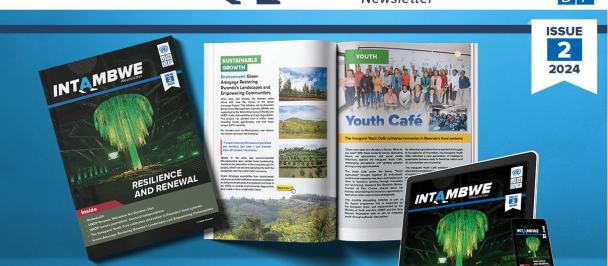World Press Freedom Day in Rwanda (Photo: Alice Kayibanda/UNDP in Rwanda)
On 3 May, the UN marked the 20th anniversary of World Press Freedom Day, a day set aside world over to celebrate the fundamental principles of press freedom; assess the state of press freedom throughout the world; defend the media from attacks on its independence and pay tribute to journalists who have lost their lives in the line of duty.
The theme for this year’s World Press Freedom Day, “Safe to Speak: Securing Freedom of Expression in All Media”, highlights the need for action to upholding the right of journalists to carry out their vital work.
Freedom of expression is a fundamental human right, enshrined in Article 19 of the Universal Declaration of Human Rights. It is a cornerstone of good governance, sustainable development, and lasting peace and security.
From traditional media platforms such as radio, print and television, to newer and more and more popular social media, blogs and citizen-led reporting, journalists are increasingly at risk. Over the past decade, more than 600 journalists have been killed – at least 120 in the past year alone. Hundreds more have been detained.
In response, the United Nations system has established a Plan of Action on the Safety of Journalists and the Issue of Impunity. The plan aims to raise awareness and to support practical steps to create a free and safe working environment for journalists.
As we mark World Press Freedom Day, UNDP is moving forward to do its utmost to enable all journalists in all media to do their jobs. According to UN Secretary General Ban Ki Moon: “When it is safe to speak, the whole world benefits”.
In Rwanda, the United Nations Development Programme (UNDP) is supporting the media sector reforms as part of its good governance programmes to enhance access to information, freedom of expression and media professionalism.
The on-going support is in collaboration with the Government of Belgium, which has been funding the Inclusive Participation in Governance Programme (IPG) project since 2011. The IPG helped establish a media law reform secretariat in Rwanda Governance Board (RGB) to fast track the reforms which culminated into three major laws being promulgated by the Parliament of Rwanda. These legislative and structural media reforms have placed Rwanda among countries striving to ensure media freedom in the world. The laws are meant to ensure a free and professional press and the right to access of information, include the Media Law, the law regulating the Media High Council Law and the Access to Information Law.
Speaking on the media reforms by the Government of Rwanda, Prof. Anastase Shyaka, Chief Executive Officer of Rwanda Governance Board (RGB) said: “Media freedoms are a strong driver of development not only in Rwanda but the region as a whole”.
By passing the Self-Regulation Law, according to Prof Shyaka, the Government has shifted the responsibilities of regulation of the media to practitioners. Another cornerstone registered in the media industry is the proposed Rwanda Broadcasting Agency, a public broadcaster which will replace the state run Bureau of Information and News.
Prof. Shyaka said media press freedoms were very important and if used well could spur development. “Media practitioners are key stakeholders to national and regional security and to the progress of their countries and therefore should conduct themselves responsibly, sensibly and grow to be competitive. The media should articulate and negotiate our image and place as a country and a region”.
Similarly, at the World Press Freedom Day celebrations the CEO of Rwanda Governance Board reiterated that freedom of expression is a right provided for by the legal framework in Rwanda.
In an interview with the press about UNDP’s support, Mr. Lamin Momodou Manneh, the UN Resident Coordinator/UNDP Resident Representative to Rwanda underscored freedom of expression as one of the pillars of the UN and a fundamental Human Right. “It is for this reason that we are supporting media development and reforms in Rwanda,” he explained. “You know people are very critical of the media here in Rwanda. But I think the government has taken bold and important in enacting the media laws”, he said.
The Inclusive Participation Programme ends in June 2013 but UNDP will continue to support media sector development in the coming five years as part of a new democratic governance programme to be launched in July 2013.

 Locations
Locations

